In recent years, New Zealand’s housing market has seen notable changes. As of June 2025, the average house price reached NZD 927,284. This marks a 1.87% increase from the previous year1. Understanding the average prices per square meter is crucial for those looking to buy or invest.
In this market, where you choose to buy can greatly affect the price. Cities are usually more costly than rural areas2. This info helps buyers and investors make smart decisions in a constantly changing market.
Key Takeaways
- The average house price in New Zealand is NZD 927,284 as of June 2025.
- There has been a 1.87% increase in average house prices over the past year.
- The cheapest homes are in the Buller, Waitomo, and Ruapehu districts.
- Queenstown-Lakes, Auckland, and Thames-Coromandel are the most expensive regions.
- Average housing prices per square meter vary significantly between urban and rural areas.
- Different calculation methods by CoreLogic, QV, and REINZ lead to variations in reported prices.
- Investors should consider regional price variations when entering the market.
Contact us if you are Interested in Buying Property Abroad!
Overview of the New Zealand Housing Market

The New Zealand housing market analysis shows major changes, especially with changing property values. These shifts are mainly due to migration and economic factors.
In Auckland, the average property value went up by 1.6% in the last three months. It reached $1,302,0003. Meanwhile, nationwide prices have slightly fallen by 0.6%, but they’re still much higher than before Covid in March 20203.
Interest rates are key in the market now. The house price growth forecast for 2025 is just 2.1%, down from the earlier 5.8%4. Higher rates have slowed things down, affecting buyer feelings.
Investors should look at regional differences to find investment opportunities in New Zealand real estate. Construction costs have started to decrease5. With a 35% decrease in Auckland housing sales in June compared to last year, it’s important to keep up with the market5.
The New Zealand housing market has its ups and downs. Doing thorough research is crucial for buyers and investors aiming to benefit from the changing market highlighted by recent analysis.
Current Average House Prices
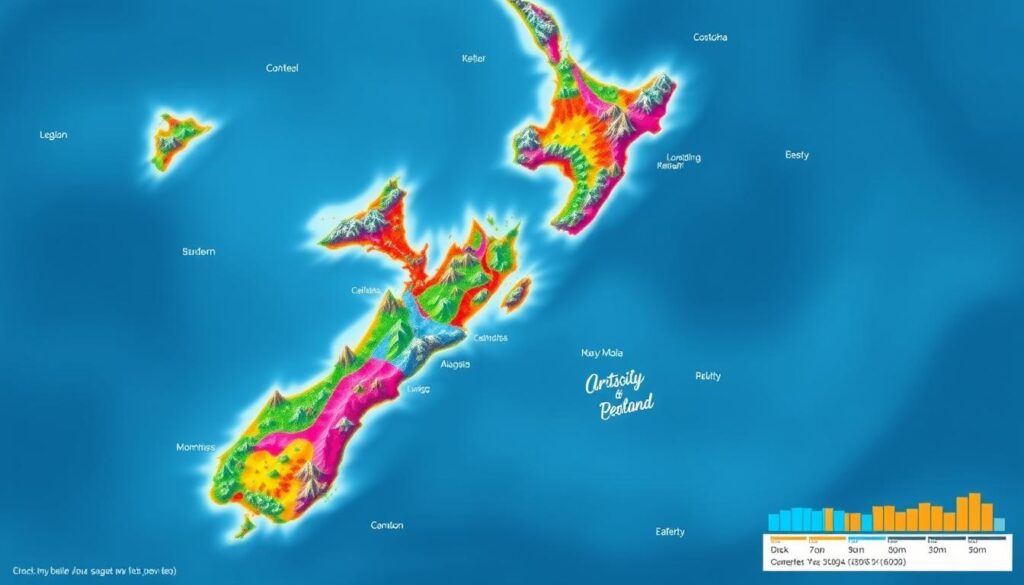
The current average house prices in New Zealand are changing. As of June 2025, the average is NZD 927,284, up by 1.87% from last year1. But the overall property value fell by 12.3%, or NZD 134,000, since last year6. Places like Auckland have higher prices, at NZD 1,263,937, which makes it very costly1
House prices vary a lot across New Zealand. The Queenstown-Lakes District has very high prices, at an average of NZD 1,823,4991. But, some areas are more affordable. Buller and Waitomo have houses for around NZD 357,802 and NZD 367,7141. This shows the range of prices and choices for buyers and investors.
The future of the housing market looks hopeful. Sales might go up by 10% this year7. While prices are tough for new buyers, who were 42.7% of new loans in March 2023, the market could get better67.
Regional Price Variations in New Zealand
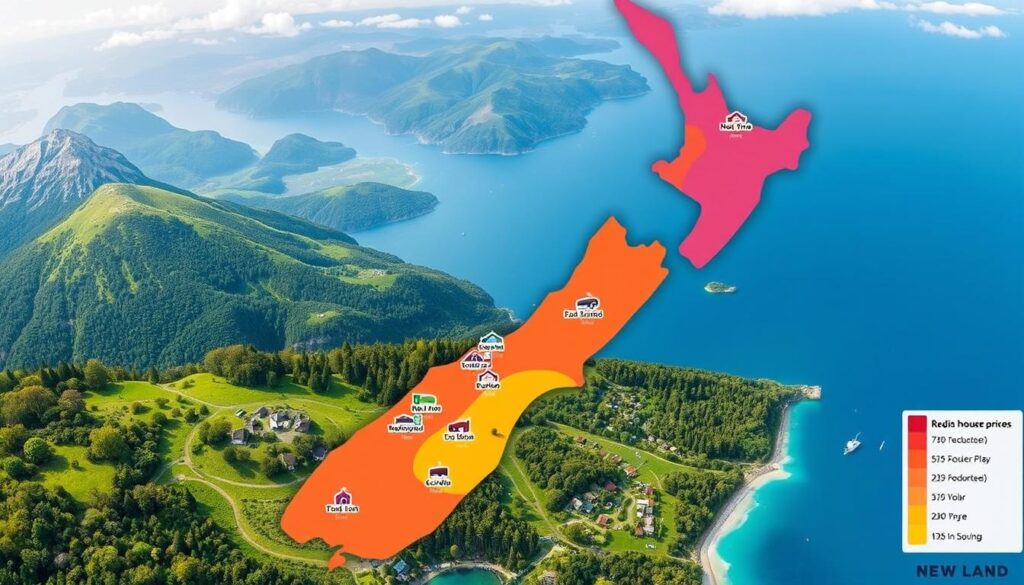
The New Zealand housing market shows varying prices in different regions. These changes are due to the area’s location and the number of people living there. Knowing about these price differences helps both buyers and investors. It tells them where they might want to buy property in the country.
Most Expensive Areas
The most expensive areas in New Zealand are led by Queenstown-Lakes District with homes averaging NZD 1,823,499. Auckland follows with houses costing about NZD 1,263,937 on average, and Thames-Coromandel District with prices around NZD 1,193,828. High demand from those wanting luxury homes and tourists has pushed the prices up in these locations.
Least Expensive Areas
On the other hand, the least expensive areas show more affordable prices. The most wallet-friendly place is Buller District, with homes averaging NZD 357,802. Waitomo District comes next with prices about NZD 367,714, followed by Ruapehu District at NZD 381,714. Buyers looking for cheaper options but still wanting to enjoy the beauty of New Zealand are drawn to these areas. The price differences between regions can significantly impact where people decide to buy.
For more insights into the housing trends and market movements, the New Zealand real estate market analysis is a great resource8. It explains what causes these price changes across regions.
Understanding Average House Prices per Square Meter
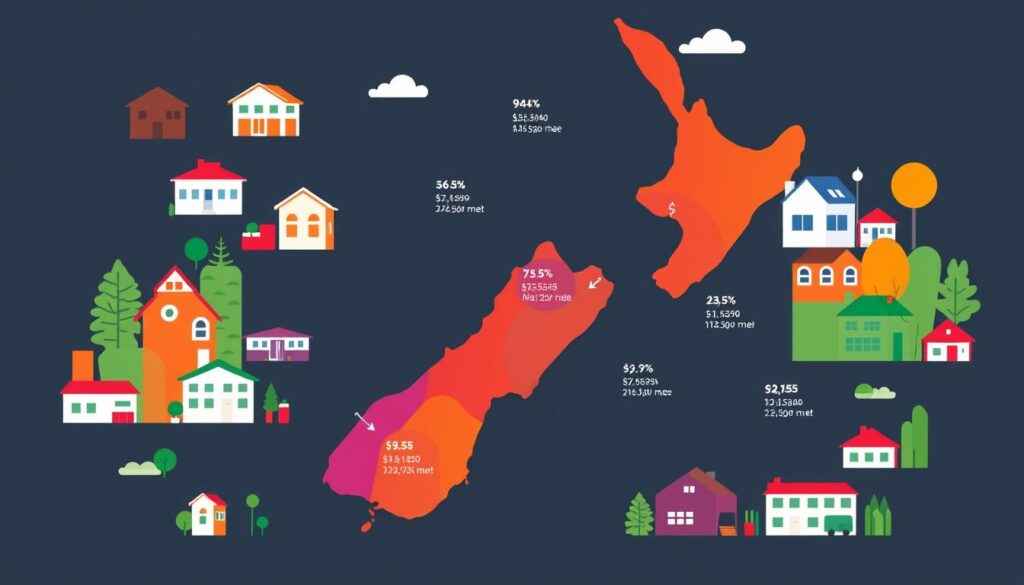
To really get what’s going on, we need to look at how much houses cost per square meter in New Zealand. In city centers, the average cost is about NZD 6,841.60. But, if you step outside these busy areas, the price drops to NZD 5,304.339. In places with lots of people wanting to live there, like Auckland, it’s even more. The cost in the city center hits NZD 9,865.00, but decrease to NZD 8,141.14 outside the city9. By studying these numbers, buyers can find their way through the market better.
How much building a house costs is also key in figuring out average prices per square meter. For simple homes, expect to pay about NZD 2,000 per square meter. For really fancy ones, it can jump to NZD 5,000 or more9. Also, paying the architect takes up about 5-10% of the total building cost9. Knowing this helps future home owners understand their spending.
Money matters a lot too when it comes to buying a house. Low interest rates make loans cheaper, which can boost house values. Meanwhile, more people working means more folks ready to buy houses10. Also, how fast the economy grows and inflates can change the real estate scene10. Getting these points helps buyers make smart moves in the market.
Focusing just on average prices doesn’t give the whole picture of the housing market11. Looking at detailed stats on house prices in different places helps buyers and investors make well-informed choices when they’re checking out their options.
Contact us if you are Interested in Buying Property Abroad!
Factors Influencing the Housing Market
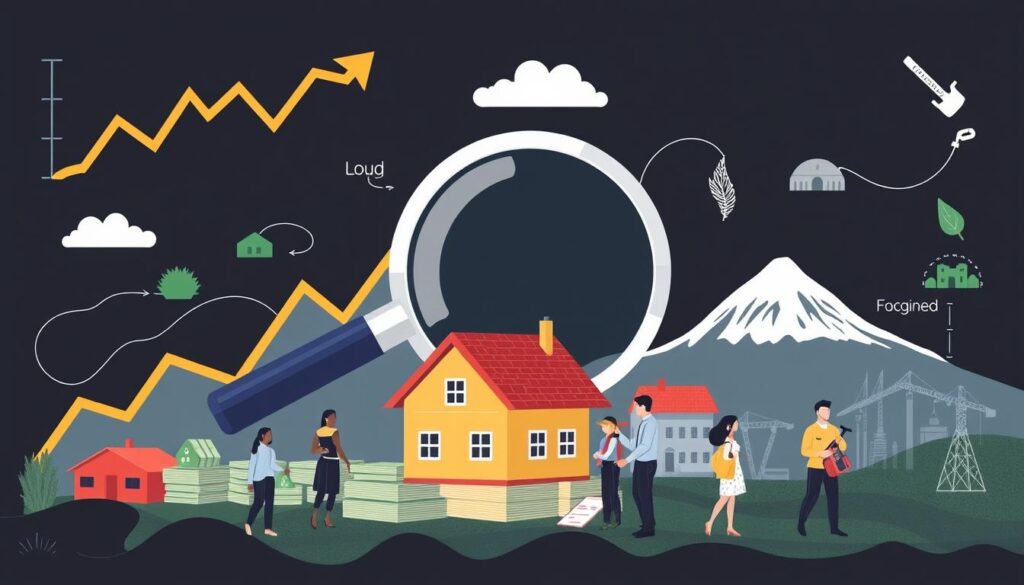
Many factors shape New Zealand’s housing market. Knowing these can help buyers and investors make informed decisions. Key influences include economic trends and government policies.
Economic Trends
Economic trends deeply affect housing demand and prices. The national House Price Index (HPI) grew by 1.5% last year, reaching a median price of $575,000 in New Zealand12. Despite this, challenges like a 6.7% inflation rate affect how affordable homes are13. Meanwhile, a 3.9% unemployment rate boosts housing affordability and wage growth12.
Government Regulations
Government rules significantly shape the housing market. The Foreign-Buyer Ban changed the way foreign investors affect prices14. Moreover, the Reserve Bank of New Zealand’s interest rate hike from 4.75% to 5.25% in April 2023 influences borrowing costs and demand13. Upcoming policy changes around the New Zealand election will likely impact the market too13.
| Factor | Description |
|---|---|
| Economic Growth | Increased GDP, driving housing demand. |
| Interest Rates | Low mortgage rates improving affordability. |
| Government Regulations | Policies affecting foreign ownership and lending. |
| Housing Supply | Current shortfall of 71,000 houses contributing to competition14. |
Real Estate Trends in New Zealand
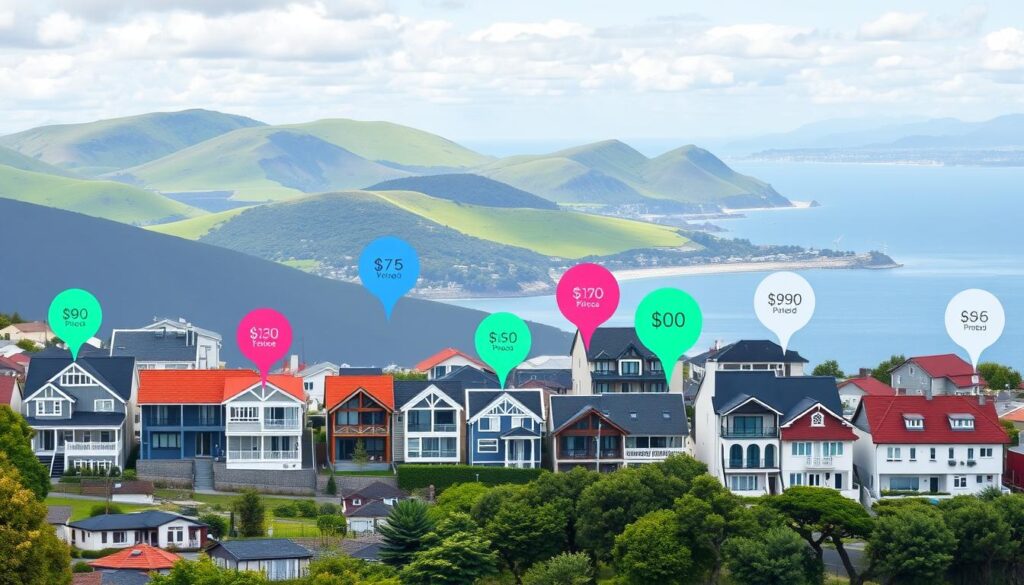
Currently, New Zealand’s real estate is shifting towards suburban living. This is because more people are working from home. They now prefer homes outside the city centers. This shift is mainly to find more affordable options due to rising costs.
People moving to less crowded areas opens new doors in the housing market. The Southern Lakes area has seen sales between $12-14 million. This includes buyers from New Zealand and Americans with New Zealand residency15.
Also, there’s a big push for green and eco-friendly houses. More and more, buyers want homes that are good for the planet. This demand is making builders think more about the environment. Christchurch is getting popular because of its new public buildings and updated downtown15.
The housing market is changing fast, with a 200% jump in inquiries from the US in October. This shows that more international investors are interested. They’re looking at places like Coromandel and Hawke’s Bay16.
Experts think that in 2025, the market will start to stabilize. Property values are expected to grow slowly but surely. For investors, it’s vital to keep an eye on these trends. This will help them make smart choices in New Zealand’s residential property market.
Conclusion
The New Zealand housing market is both complex and promising for those looking to buy or invest. House prices keep going up, with big differences across the country. The current average property value in New Zealand is $924,489. This marks a 2.1% increase over the past three months17. With prices rising and regulations getting tighter, finding affordable homes is getting tough18.
The government is stepping in with funding and policies to help first-time buyers. It’s set aside NZD3.8 billion and introduced the Progressive Home Ownership Fund18. But, the high cost of land, especially in Auckland, makes it hard to keep homes affordable and sustainable19.
It’s important for buyers to keep up with trends and stats in New Zealand’s housing market. This knowledge is key in making good decisions, given the climbing interest rates and changing rules. For more details, check out this resource. Staying updated on market trends is crucial in navigating this ever-changing environment.
Contact us if you are Interested in Buying Property Abroad!
FAQ
What is the current average house price in New Zealand?
As of June 2025, the average house price in New Zealand is about NZD 927,284. This is a 1.87% rise from last year.
How do property prices vary across different regions in New Zealand?
Property prices in New Zealand vary a lot. For example, Queenstown-Lakes District has the highest prices, averaging around NZD 1,823,499. On the other hand, the Buller District is much cheaper, with an average of NZD 357,802.
What influence do economic trends have on the New Zealand housing market?
Economic trends play a big role in the New Zealand housing market. Things like GDP growth, job rates, and interest rates can drive demand and affect property prices.
Are there specific government regulations that affect the New Zealand housing market?
Yes, several government rules, especially those about foreign property ownership and loan policies, greatly affect the housing market in New Zealand.
What are the potential investment opportunities in New Zealand real estate?
Investors might find good chances in developing areas. Trends like remote working are making suburban markets more popular. Also, properties focusing on being green and eco-friendly are appealing.
How do average house prices per square meter differ in New Zealand?
The average price per square meter in city centers of New Zealand is NZD 6,841.60. Outside city centers, it falls to around NZD 5,304.33.
What are some key real estate trends currently observed in New Zealand?
Key trends in New Zealand include moving towards suburban life. There’s a higher need for affordable options. Plus, there is a big focus on homes that are sustainable and kind to the environment.
Where is information available to check the latest housing market statistics?
To get the latest on the housing market, you can look at real estate websites. Government pages and market reports also offer fresh statistics and analysis.
Source Links
- https://www.opespartners.co.nz/property-markets/average-house-price-nz
- https://wise.com/us/blog/new-zealand-real-estate-housing-prices
- https://www.nzherald.co.nz/nz/auckland-housing-market-finally-ends-15-year-downturn-analysts-agree/WEMEORG7MJFI3BXOEL43TCA3C4/
- https://www.westpaciq.com.au/economics/2024/06/nz-house-price-update-june-2024
- https://www.squirrel.co.nz/blogs/housing-market/nz-property-market-update-july-2024
- https://www.oneroof.co.nz/news/new-zealand-house-prices-what-you-need-to-know-43314
- https://www.corelogic.co.nz/news-research/news/2024/soft-start-for-nz-housing-market-in-march-quarter
- https://www.mpamag.com/nz/mortgage-industry/market-updates/winter-chill-hits-nz-property-market/497221
- https://www.moneyhub.co.nz/building-costs-per-square-metre.html
- https://www.loweandco.nz/blog/what-factors-determine-residential-property-value
- https://www.interest.co.nz/charts/real-estate/median-price-reinz
- https://www.najibrealestate.co.nz/Social/Najib-Blog/Five-Economic-Variables-Which-Affect-the-NZ-Real-Estate-Economy/
- https://www.loweandco.nz/blog/new-zealand-housing-market-trends
- https://blog.mortgagesupply.co.nz/blog/10-factors-that-affect-the-housing-market
- https://www.nzsothebysrealty.com/insights/news/nz-housing-market-predictions
- https://www.rnz.co.nz/news/on-the-inside/515948/buyer-s-market-but-not-many-buyers-what-is-happening-with-the-nz-housing-market
- https://www.raineandhorne.co.nz/news/homeowners-buyers/robust-conclusion-to-2023-bodes-well-for-real-estate-sector
- https://www.dlapiper.com/en/insights/publications/real-estate-gazette/real-estate-gazette-living-capital/12-new-zealand-tackling-the-affordable-housing-crisis-in-new-zealand
- https://www.treasury.govt.nz/sites/default/files/2017-10/uc-andrewhallot.pdf

Comments